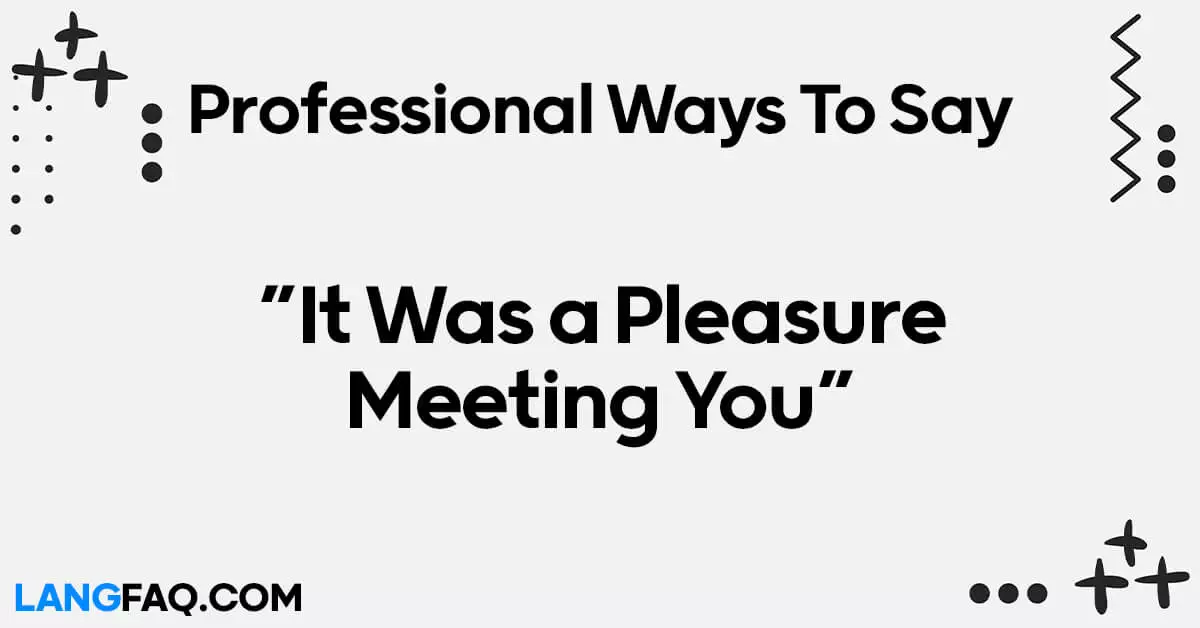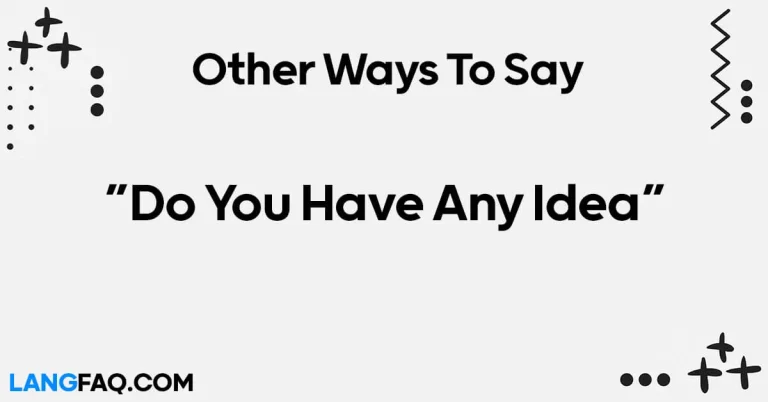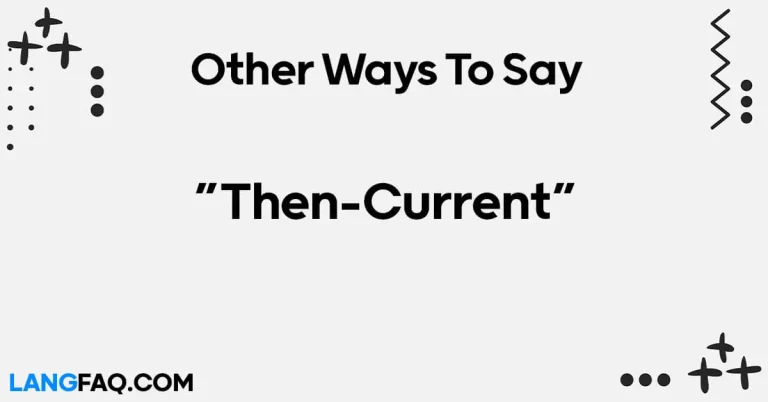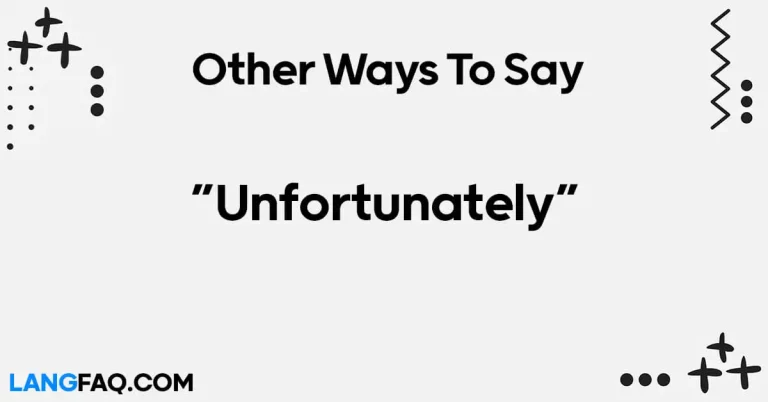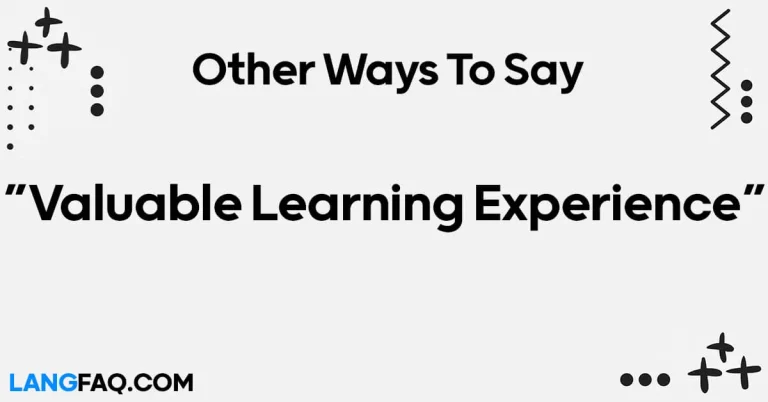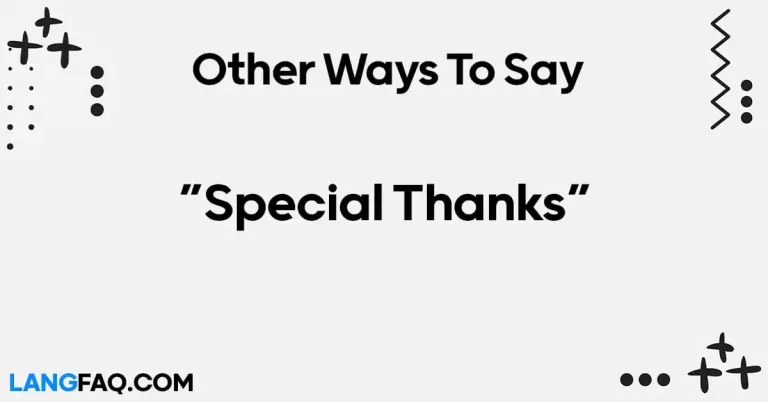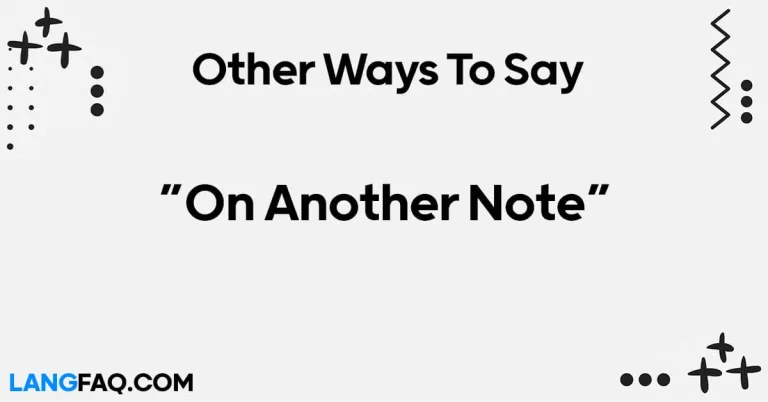In the world of business and networking, making a positive impression is crucial. When you meet someone new, whether it’s a potential client, colleague, or partner, you want to convey your appreciation for the encounter in a professional and memorable manner.
Saying “It was a pleasure meeting you” is polite, but it can become mundane. To stand out, you need a repertoire of alternative phrases that convey the same sentiment with a touch of sophistication.
In this article, we will explore 12 professional ways to express your pleasure at meeting someone.
12 Professional Ways to Say “It Was a Pleasure Meeting You”
Here are 12 professional ways to say “It Was a Pleasure Meeting You”:
- “It was a delight to make your acquaintance.”
- “Meeting you was truly enjoyable.”
- “I found our meeting to be quite pleasant.”
- “It was a privilege to have met you.”
- “Our encounter was a positive experience.”
- “I had the pleasure of meeting you.”
- “It was an honor to be in your company.”
- “Meeting you added value to my day.”
- “I’m grateful for our meeting.”
- “Our interaction was a highlight.”
- “It was a joy to connect with you.”
- “I look forward to our next encounter.”
These expressions can help you convey your appreciation and leave a positive impression after a meeting.
Here’s a table with the meanings and examples of the 12 professional ways to say “It Was a Pleasure Meeting You”:
| Expression | Meaning | Example Sentence |
|---|---|---|
| It was a delight to make your acquaintance. | Expressing happiness at meeting someone new. | “It was a delight to make your acquaintance at the conference.” |
| Meeting you was truly enjoyable. | Describing the meeting as genuinely pleasant. | “Meeting you was truly enjoyable, and I hope we can collaborate soon.” |
| I found our meeting to be quite pleasant. | Conveying that the meeting was enjoyable. | “I found our meeting to be quite pleasant, and I look forward to future discussions.” |
| It was a privilege to have met you. | Implying that meeting the person was an honor. | “It was a privilege to have met you, and I admire your work.” |
| Our encounter was a positive experience. | Indicating that the meeting had a positive impact. | “Our encounter was a positive experience, and I appreciate your insights.” |
| I had the pleasure of meeting you. | Expressing the pleasure of the meeting. | “I had the pleasure of meeting you, and your expertise is impressive.” |
| It was an honor to be in your company. | Showing respect and admiration. | “It was an honor to be in your company during the event.” |
| Meeting you added value to my day. | Highlighting the significance of the meeting. | “Meeting you added value to my day, and I’m grateful for the opportunity.” |
| I’m grateful for our meeting. | Expressing gratitude for the encounter. | “I’m grateful for our meeting and the chance to collaborate.” |
| Our interaction was a highlight. | Describing the meeting as a memorable moment. | “Our interaction was a highlight of the conference.” |
| It was a joy to connect with you. | Conveying happiness at the connection made. | “It was a joy to connect with you, and I look forward to future collaborations.” |
| I look forward to our next encounter. | Expressing anticipation of future meetings. | “I look forward to our next encounter and further discussions.” |
These expressions can help you articulate your pleasure and appreciation in various professional situations.
Is It Professional to Say “It Was a Pleasure Meeting You”?
When it comes to professional etiquette, expressing gratitude and courtesy is essential. One common phrase that often surfaces after a professional encounter is “It was a pleasure meeting you.” But is this expression truly professional, or should we explore more refined ways to convey our appreciation?
The Professional Aspect
“It was a pleasure meeting you” is a courteous and polite way to wrap up a professional interaction. It communicates a sense of gratitude and leaves a positive impression on the individual you’ve met. In many professional settings, this phrase is not only acceptable but also encouraged.
1. Demonstrates Respect
Expressing that you found the meeting pleasant shows respect for the other person’s time and contributions to the conversation.
2. Fosters Positive Relationships
It sets a friendly and optimistic tone, making it more likely for the individual to remember you positively.
3. Encourages Future Interactions
By expressing pleasure in the meeting, you open the door for potential future collaborations or discussions.
4. Common Courtesy
Using polite and courteous language is a standard practice in professional interactions.
The Alternatives
While “It was a pleasure meeting you” is indeed professional, there are alternatives that you can use to add variety to your expressions of appreciation. In the previous sections, we explored twelve different ways to convey your positive sentiments after a meeting, each with its unique charm and impact.
When to Use Alternatives
The choice between the standard expression and its alternatives depends on various factors, including:
- The formality of the setting
- Your relationship with the individual
- The specific context of the meeting
In more formal or initial encounters, sticking to “It was a pleasure meeting you” might be a safe choice. However, as you build a rapport or engage with someone in a less formal setting, trying out one of the alternatives can be a delightful way to express your appreciation differently.
The Final Verdict
In conclusion, saying “It was a pleasure meeting you” is, without a doubt, a professional and courteous way to wrap up a meeting. It’s a phrase that carries a positive tone and demonstrates respect and gratitude. However, it’s important to be mindful of the context and your relationship with the individual. Using alternatives can add variety and warmth to your expressions of appreciation, enhancing your professional interactions.
So, whether you choose to stick with the classic or explore the alternatives, remember that genuine appreciation and positivity in your professional interactions can go a long way in building meaningful connections and fostering future collaborations.
What to Say Instead of “It Was a Pleasure Meeting You”
Here’s a list of alternatives to “It was a pleasure meeting you” that you can use to convey your appreciation and leave a lasting impression after a professional encounter:
- “It was an honor to meet you.”
- “Meeting you added value to my day.”
- “Let’s definitely meet again soon.”
- “I’m glad we had the chance to connect.”
- “I look forward to our next interaction.”
- “Our meeting was truly enjoyable.”
- “It’s been a pleasure getting to know you.”
- “Our encounter was both meaningful and inspiring.”
- “I’m grateful for our insightful discussion.”
- “I appreciate the opportunity to meet with you.”
- “Our meeting was a highlight of my day.”
- “Thank you for a productive and enjoyable meeting.”
These alternatives allow you to express your appreciation in different ways, catering to the specific context and your relationship with the individual you’ve met. Choose the expression that resonates best with the situation, and you’ll leave a positive and memorable impression in your professional interactions.
“It was a delight to make your acquaintance.”
Meaning: Expressing happiness at meeting someone new.
Usage: This phrase is versatile and suitable for both formal and informal contexts. It conveys genuine pleasure at meeting someone for the first time.
Example Sentence: “It was a delight to make your acquaintance at the conference. Your insights were truly inspiring.”
Variations:
- It was delightful to meet you.
- It’s been a pleasure getting to know you.
- Meeting you has been a delightful experience.
Dictionary Insight: According to the Cambridge Dictionary, “acquaintance” refers to a person one knows slightly, but not well.
Tips: Use this phrase when you want to express your happiness at meeting someone new, especially in situations where you’d like to build a positive rapport.
Pros: It’s a courteous and warm way to express your pleasure at the introduction.
Cons: It may be seen as slightly formal in very casual situations, so gauge the context accordingly.
Related Grammar/Usage Rule: This phrase works well in the past tense when referring to the initial meeting.
Exception: It’s generally used in positive contexts. Avoid using it if the meeting was not enjoyable.
Definition: Making someone’s acquaintance means to meet them for the first time and get to know them.
Short Dialogue Snippet:
- Person A: “It was a delight to make your acquaintance at the networking event.”
- Person B: “Thank you! The pleasure is mine. I enjoyed our conversation.”
Email Sample: Subject: Nice Meeting You at the Conference
Dear [Name],
I hope this email finds you well. I wanted to express my gratitude for the opportunity to meet you at the recent conference. It was a delight to make your acquaintance and discuss our shared interests.
Your insights were truly inspiring, and I look forward to the possibility of collaborating in the future. Please do not hesitate to reach out if you ever need any assistance or if you’d like to continue our conversation.
Once again, it was a pleasure meeting you, and I hope our paths cross again soon.
Best regards, [Your Name]
“Meeting you was truly enjoyable.”
Meaning: Describing the meeting as genuinely pleasant.
Usage: This phrase is suitable for both formal and informal contexts, especially when you want to emphasize the enjoyment of the encounter.
Example Sentence: “Meeting you was truly enjoyable, and I appreciate the opportunity to exchange ideas.”
Variations:
- Our encounter was genuinely pleasant.
- I had a genuinely enjoyable time meeting you.
- It was a truly delightful meeting.
Dictionary Insight: “Genuinely” means in a sincere and authentic manner, according to the Cambridge Dictionary.
Tips: Use this phrase to express your genuine pleasure after a meeting, highlighting that it was not just a routine encounter.
Pros: It conveys sincerity and can be applied in various settings.
Cons: While versatile, it may sound slightly informal in extremely formal situations.
Related Grammar/Usage Rule: Use this phrase when you want to emphasize the authenticity of your enjoyment during the meeting.
Exception: Avoid using it if the encounter was not genuinely enjoyable.
Definition: Genuinely enjoyable means that the meeting was truly pleasant and satisfying.
Short Dialogue Snippet:
- Person A: “Meeting you was truly enjoyable. Your presentation was outstanding.”
- Person B: “Thank you, I’m glad to hear that. I enjoyed our discussion as well.”
Email Sample: Subject: A Truly Enjoyable Meeting
Dear [Name],
I wanted to take a moment to express my sincere appreciation for our recent meeting. Meeting you was truly enjoyable, and I found our discussion both enlightening and engaging.
Your insights added tremendous value to our conversation, and I look forward to the possibility of future collaborations. If there’s anything I can assist you with or if you’d like to continue our exchange of ideas, please feel free to reach out.
Once again, thank you for a genuinely enjoyable meeting. I hope to connect with you again soon.
Warm regards, [Your Name]
The next expression adds a touch of charm to your appreciation. Stay tuned!
“I found our meeting to be quite pleasant.”
Meaning: Conveying that the meeting was enjoyable.
Usage: This phrase is suitable for various professional contexts, where you want to express that the meeting was enjoyable without sounding overly formal.
Example Sentence: “I found our meeting to be quite pleasant, and I’m looking forward to our next discussion.”
Variations:
- Our encounter was rather pleasant.
- The meeting was quite enjoyable.
- I thoroughly enjoyed our time together.
Dictionary Insight: “Quite” in this context means to a certain degree, as per the Cambridge Dictionary.
Tips: Use this phrase when you want to express that the meeting was enjoyable without being too formal.
Pros: It strikes a balance between formality and friendliness, making it versatile.
Cons: In very formal situations, it might sound slightly informal.
Related Grammar/Usage Rule: Use “quite” to indicate a moderate level of pleasantness in the meeting.
Exception: Avoid using it if you found the meeting to be less than pleasant.
Definition: Describing a meeting as “quite pleasant” means that it was enjoyable to a certain degree.
Short Dialogue Snippet:
- Person A: “I found our meeting to be quite pleasant, don’t you think?”
- Person B: “Absolutely, I thoroughly enjoyed our discussion.”
Email Sample: Subject: Our Meeting Was Quite Pleasant
Dear [Name],
I hope this email finds you well. I wanted to extend my gratitude for our recent meeting, which I found to be quite pleasant. Our discussion was engaging, and I appreciate the insights you shared.
I’m looking forward to our next encounter and the possibility of working together. Should you have any questions or ideas you’d like to explore further, please don’t hesitate to reach out.
Once again, thank you for a rather pleasant meeting, and I hope we can continue our collaboration.
Warm regards, [Your Name]
“It was a privilege to have met you.”
Meaning: Implying that meeting the person was an honor.
Usage: This phrase carries a formal tone and is suitable for situations where you want to convey deep respect and admiration.
Example Sentence: “It was a privilege to have met you, and I hold your expertise in high regard.”
Variations:
- Meeting you was a true privilege.
- It has been an honor to meet you.
- I consider it a privilege to have crossed paths with you.
Dictionary Insight: According to the Cambridge Dictionary, “privilege” refers to a special advantage or honor not enjoyed by everyone.
Tips: Use this phrase to express profound respect and admiration, especially when you genuinely consider meeting the person an honor.
Pros: It conveys deep respect and can leave a lasting impression in formal settings.
Cons: It may sound overly formal in very casual or introductory encounters.
Related Grammar/Usage Rule: This phrase is often used to express a profound sense of privilege in meeting someone.
Exception: Avoid using it in situations where the formality might be seen as excessive.
Definition: Describing the meeting as a privilege means that it was an honor and a special advantage to have met the person.
Short Dialogue Snippet:
- Person A: “It was a privilege to have met you, Mr. Smith.”
- Person B: “The privilege was mine. Your reputation precedes you.”
Email Sample: Subject: Meeting You – A True Privilege
Dear [Name],
I trust this email finds you well. I wanted to take a moment to express my deep appreciation for our recent meeting. It was a privilege to have met you, and I hold your expertise and insights in high regard.
Our conversation was not only enlightening but also a source of inspiration. I’m genuinely excited about the potential for collaboration in the future and the opportunity to learn from you.
Should there be any way I can be of assistance or if you wish to explore ideas further, please do not hesitate to contact me.
Once again, thank you for a truly privileged encounter, and I look forward to our next discussion.
Warm regards, [Your Name]
Our next expression focuses on emphasizing the positive experience of the meeting.
“Our encounter was a positive experience.”
Meaning: Indicating that the meeting had a positive impact.
Usage: This phrase is versatile and can be used in both formal and informal contexts to highlight the positive aspects of the meeting.
Example Sentence: “Our encounter was a positive experience, and I’m grateful for the valuable insights you shared.”
Variations:
- The meeting was a positive experience.
- I had a positive experience meeting you.
- It was truly a positive encounter.
Dictionary Insight: “Positive” refers to something characterized by optimism or constructive qualities, as per the Cambridge Dictionary.
Tips: Use this phrase when you want to emphasize the beneficial and optimistic aspects of the meeting.
Pros: It’s adaptable to various situations and conveys a sense of optimism.
Cons: It may not stand out as much as some other expressions in very formal settings.
Related Grammar/Usage Rule: Emphasize the word “positive” to convey the beneficial nature of the encounter.
Exception: Avoid using it if the meeting had a primarily negative impact.
Definition: Describing the meeting as a “positive experience” means that it had constructive and optimistic qualities.
Short Dialogue Snippet:
- Person A: “Our encounter was a positive experience, wouldn’t you agree?”
- Person B: “Absolutely, I left the meeting feeling motivated and inspired.”
Email Sample: Subject: Reflecting on Our Positive Meeting
Dear [Name],
I hope this message finds you in good spirits. I wanted to take a moment to express my gratitude for our recent meeting. Our encounter was a positive experience, and I genuinely appreciated the valuable insights and perspectives you brought to the table.
Your contributions added immense value to our discussion, and I’m eager to explore potential collaborations in the future. If there are any ideas you’d like to delve into further or if you simply wish to continue our positive exchange, please feel free to reach out.
Once again, thank you for a meeting that left me with a sense of optimism, and I look forward to our next interaction.
Warm regards, [Your Name]
We have more expressions to explore, each with its unique charm and impact. Stay tuned for the next one!
“I had the pleasure of meeting you.”
Meaning: Expressing the pleasure of the meeting.
Usage: This phrase is versatile and can be used in various professional contexts to convey genuine pleasure.
Example Sentence: “I had the pleasure of meeting you, and I’m impressed by your expertise.”
Variations:
- It was a pleasure to meet you.
- Meeting you was a true pleasure.
- I found our meeting to be a pleasure.
Dictionary Insight: According to the Cambridge Dictionary, “pleasure” refers to a feeling of happiness or satisfaction.
Tips: Use this phrase when you want to express your genuine pleasure after a meeting, and you want to maintain a friendly tone.
Pros: It’s adaptable to different situations and conveys sincerity.
Cons: In extremely formal settings, it might be seen as slightly informal.
Related Grammar/Usage Rule: Use this phrase to highlight the happiness and satisfaction derived from the meeting.
Exception: Avoid using it if the meeting did not bring you any pleasure.
Definition: Describing the meeting as a “pleasure” means that it brought happiness or satisfaction.
Short Dialogue Snippet:
- Person A: “I had the pleasure of meeting you at the seminar.”
- Person B: “The pleasure was mine. I enjoyed our discussion immensely.”
Email Sample: Subject: Meeting You – A True Pleasure
Dear [Name],
I trust this message finds you well. I wanted to express my heartfelt gratitude for our recent meeting. I had the pleasure of meeting you, and I must say that your expertise and insights left a lasting impression.
Our discussion was not only productive but also enjoyable, and I’m eager to explore opportunities for collaboration in the future. If there’s anything I can assist you with or if you’d like to continue our pleasant exchange, please do not hesitate to get in touch.
Once again, thank you for a meeting that truly was a pleasure, and I hope our paths cross again soon.
Warm regards, [Your Name]
Stay tuned as we delve into more ways to express your appreciation professionally, including the formal phrase “It was an honor to be in your company.”
“It was an honor to be in your company.”
Meaning: Showing respect and admiration.
Usage: This phrase carries a formal tone and is suitable for situations where you want to convey deep respect and admiration.
Example Sentence: “It was an honor to be in your company during the event, and I’m inspired by your achievements.”
Variations:
- I was honored to meet you.
- Meeting you was a true honor.
- It has been an honor to have crossed paths with you.
Dictionary Insight: “Honor” refers to a feeling of great respect or privilege, according to the Cambridge Dictionary.
Tips: Use this phrase to express profound respect and admiration, especially when you genuinely consider being in the person’s company an honor.
Pros: It conveys deep respect and can leave a lasting impression in formal settings.
Cons: It may sound overly formal in very casual or introductory encounters.
Related Grammar/Usage Rule: This phrase is often used to express profound respect and admiration.
Exception: Avoid using it in situations where the formality might be seen as excessive.
Definition: Describing the meeting as an “honor” means that it was a privilege and a matter of great respect to be in the person’s company.
Short Dialogue Snippet:
- Person A: “It was an honor to be in your company during the gala.”
- Person B: “The honor was mine. Your achievements are truly inspiring.”
Email Sample: Subject: An Honor to Be in Your Company
Dear [Name],
I hope this message finds you in good health and high spirits. I wanted to take a moment to express my heartfelt appreciation for our recent encounter. It was an honor to be in your company during the event, and I was truly inspired by your achievements.
Our conversation left a profound impact on me, and I look forward to the possibility of further collaborations. If there are any ideas or projects you’d like to explore together, please do not hesitate to reach out.
Once again, thank you for a meeting that I consider a true honor, and I hope our paths cross again soon.
Warm regards, [Your Name]
“Meeting you added value to my day.”
Meaning: Highlighting the significance of the meeting.
Usage: This phrase is versatile and can be used in both formal and informal contexts to convey that the meeting had a meaningful and positive impact.
Example Sentence: “Meeting you added value to my day, and I’m excited about the possibilities ahead.”
Variations:
- Our encounter enriched my day.
- I found our meeting to be valuable.
- It was a pleasure, and it brightened my day.
Dictionary Insight: “Value” refers to the worth or importance of something, according to the Cambridge Dictionary.
Tips: Use this phrase when you want to emphasize that the meeting was not just routine but added significance to your day.
Pros: It conveys the idea that the meeting was meaningful and valuable.
Cons: In very formal settings, it may sound slightly informal.
Related Grammar/Usage Rule: Use this phrase to express the idea that the meeting brought worth or significance to your day.
Exception: Avoid using it if the meeting did not add any value or significance.
Definition: Describing the meeting as adding value to your day means that it contributed positively to your day’s worth or importance.
Short Dialogue Snippet:
- Person A: “Meeting you added value to my day.”
- Person B: “I’m glad to hear that. It brightened my day as well.”
Email Sample: Subject: Our Meeting Added Value to My Day
Dear [Name],
I trust this email finds you well. I wanted to take a moment to express my sincere appreciation for our recent meeting. Meeting you added value to my day, and I left our encounter feeling truly inspired.
Your insights and perspectives were invaluable, and I’m excited about the potential for future collaborations. If there’s anything I can assist you with or if you’d like to continue our discussion, please feel free to reach out.
Once again, thank you for a meeting that brought significance to my day, and I look forward to our next interaction.
Warm regards, [Your Name]
Our next expression emphasizes anticipation for future meetings.
“I’m looking forward to our next encounter.”
Meaning: Expressing anticipation of future meetings.
Usage: This phrase is versatile and can be used in various professional contexts to convey eagerness for future interactions.
Example Sentence: “I’m looking forward to our next encounter, where we can explore ideas further.”
Variations:
- I eagerly await our next meeting.
- Our next encounter holds promise.
- I anticipate our future discussions.
Dictionary Insight: “Anticipation” refers to the act of looking forward to something, according to the Cambridge Dictionary.
Tips: Use this phrase when you want to convey your enthusiasm for future meetings and collaborations.
Pros: It conveys eagerness and optimism for future interactions.
Cons: In very formal settings, it may sound slightly informal.
Related Grammar/Usage Rule: Use this phrase to express your anticipation for future meetings and discussions.
Exception: Avoid using it if you do not anticipate future interactions.
Definition: Expressing anticipation for future encounters means that you eagerly look forward to meeting again.
Short Dialogue Snippet:
- Person A: “I’m looking forward to our next encounter.”
- Person B: “Likewise, I can’t wait to continue our discussions.”
Email Sample: Subject: Anticipating Our Next Meeting
Dear [Name],
I hope this message finds you in high spirits. I wanted to express my excitement and anticipation for our future meetings. I’m looking forward to our next encounter, where we can delve deeper into the ideas we discussed.
Our previous meeting was both productive and enjoyable, and I believe there’s much more we can achieve together. If there are any specific topics or projects you’d like to explore in our upcoming discussions, please do let me know.
Once again, I’m eagerly awaiting our next meeting and the opportunity to collaborate further.
Warm regards, [Your Name]
The next expression adds charm to your appreciation.
“Let’s definitely meet again soon.”
Meaning: Using the word “definitely” to add emphasis and commitment to your desire for a follow-up meeting.
Usage: This phrase is versatile and can be used in various professional contexts to express a strong desire for future meetings.
Example Sentence: “Let’s definitely meet again soon to continue our fruitful discussions.”
Variations:
- I’m committed to meeting again soon.
- I’m looking forward to our definite next meeting.
- We should definitely catch up soon.
Dictionary Insight: “Definitely” means without any doubt, according to the Cambridge Dictionary.
Tips: Use this phrase when you want to express a strong commitment to meeting again and want to add emphasis to your desire for future interactions.
Pros: It conveys a high level of commitment and enthusiasm for future meetings.
Cons: In very formal settings, it may sound slightly informal.
Related Grammar/Usage Rule: Use “definitely” to emphasize your strong commitment to meeting again.
Exception: Avoid using it if you are not genuinely committed to future interactions.
Definition: Using “definitely” in this context means that you are expressing a firm and unwavering commitment to meeting again soon.
Short Dialogue Snippet:
- Person A: “Let’s definitely meet again soon.”
- Person B: “Absolutely, I’m committed to our next meeting.”
Email Sample: Subject: Planning Our Next Meeting – Definitely!
Dear [Name],
I trust this message finds you well. I wanted to express my enthusiasm and commitment to our future meetings. Let’s definitely meet again soon to continue our fruitful discussions.
Our previous interaction left me inspired, and I believe there’s much more we can achieve together. If you have any specific topics or ideas you’d like to explore in our upcoming meetings, please do share them.
Once again, I’m eagerly looking forward to our definite next meeting and the opportunity to collaborate further.
Warm regards, [Your Name]
Our next expression combines professionalism with warmth.
“I’m glad we had the chance to connect.”
Meaning: Expressing satisfaction at the connection made.
Usage: This phrase is versatile and can be used in various professional contexts to convey satisfaction at the connection established during the meeting.
Example Sentence: “I’m glad we had the chance to connect, and I believe our collaboration holds great potential.”
Variations:
- Connecting with you was a pleasure.
- I’m thankful for our connection.
- It was great to connect with you.
Dictionary Insight: “Connect” in this context refers to establishing a relationship or forming a bond, as per the Cambridge Dictionary.
Tips: Use this phrase when you want to convey your satisfaction at the connection made during the meeting while maintaining professionalism.
Pros: It combines professionalism with warmth, making it suitable for various situations.
Cons: In very formal settings, it may sound slightly informal.
Related Grammar/Usage Rule: Use this phrase to express satisfaction at the connection established.
Exception: Avoid using it if you did not feel a positive connection during the meeting.
Definition: Expressing satisfaction at the chance to connect means that you are pleased with the relationship or bond formed during the meeting.
Short Dialogue Snippet:
- Person A: “I’m glad we had the chance to connect during the event.”
- Person B: “Likewise, it was a pleasure connecting with you. I see great potential in our collaboration.”
Email Sample: Subject: A Satisfying Connection
Dear [Name],
I hope this email finds you in good health. I wanted to take a moment to express my satisfaction and gratitude for the chance to connect with you during our recent meeting.
I’m glad we had the opportunity to establish a connection, and I believe our collaboration holds great potential. If there are any ideas or projects you’d like to explore together, please feel free to share them.
Once again, I’m thankful for our connection and look forward to the possibility of working closely in the future.
Warm regards, [Your Name]
We’ve explored several professional ways to express your appreciation after a meeting, each with its unique charm and impact. Continue reading to discover the last expression, and stay tuned for the FAQ section and conclusion.
“I look forward to our next interaction.”
Meaning: Expressing anticipation for future interactions.
Usage: This phrase is versatile and can be used in various professional contexts to convey eagerness for future meetings and discussions.
Example Sentence: “I look forward to our next interaction, where we can delve deeper into our shared interests.”
Variations:
- I eagerly await our next interaction.
- Our next interaction holds promise.
- I anticipate our future discussions.
Dictionary Insight: “Anticipate” means to expect or look forward to something happening, according to the Cambridge Dictionary.
Tips: Use this phrase when you want to express your eagerness and optimism for future interactions.
Pros: It conveys eagerness and a positive outlook for future meetings.
Cons: In very formal settings, it may sound slightly informal.
Related Grammar/Usage Rule: Use this phrase to express your anticipation for future interactions.
Exception: Avoid using it if you do not genuinely anticipate future interactions.
Definition: Expressing anticipation for future interactions means that you eagerly look forward to meeting or working together again.
Short Dialogue Snippet:
- Person A: “I look forward to our next interaction.”
- Person B: “Likewise, I can’t wait to continue our discussions.”
Email Sample: Subject: Anticipating Our Next Interaction
Dear [Name],
I hope this message finds you well. I wanted to express my excitement and anticipation for our future interactions. I look forward to our next interaction, where we can delve deeper into our shared interests and explore new ideas.
Our previous interactions have been both insightful and enjoyable, and I believe there’s much more we can achieve together. If there are any specific topics or projects you’d like to explore in our upcoming discussions, please do let me know.
Once again, I’m eagerly awaiting our next interaction and the opportunity to collaborate further.
Warm regards, [Your Name]
As we’ve explored these 12 professional ways to say “It Was a Pleasure Meeting You,” it’s essential to choose the expression that best suits the context and your relationship with the individual you’ve met. Remember that expressing genuine appreciation and positivity can leave a lasting impression.
Now, let’s move on to the FAQ section to address some common questions related to professional interactions.
FAQs
Q: How can I make my expressions more professional?
A: To make your expressions more professional, consider using phrases like “It was an honor to meet you” or “Meeting you was a highlight of my day.” These convey respect and sincerity.
Q: Is it important to express gratitude after a meeting?
A: Yes, expressing gratitude is essential in professional interactions. It shows appreciation for the person’s time and effort.
Q: What if I genuinely didn’t enjoy the meeting?
A: Even if you didn’t enjoy the meeting, it’s best to focus on the positive aspects and express gratitude for the opportunity to meet.
Q: How can I express interest in future meetings without sounding pushy?
A: You can express your interest in future meetings by saying, “I’d love to stay in touch” or “Let’s definitely meet again soon.” These phrases convey your interest without pressure.
Q: Are these expressions suitable for both formal and informal meetings?
A: Most of these expressions are versatile and can be used in both formal and informal settings. However, consider the context and your relationship with the person to choose the most appropriate one.
Q: Can I use these expressions in written communication, such as emails?
A: Absolutely! These expressions work well in written communication, such as emails or thank-you notes, to convey your appreciation professionally.
Conclusion
In the world of networking and professional relationships, the way you express your gratitude and pleasure at meeting someone can make a significant difference. By incorporating these 12 professional ways to say “It Was a Pleasure Meeting You” into your interactions, you can leave a lasting positive impression and build valuable connections.

